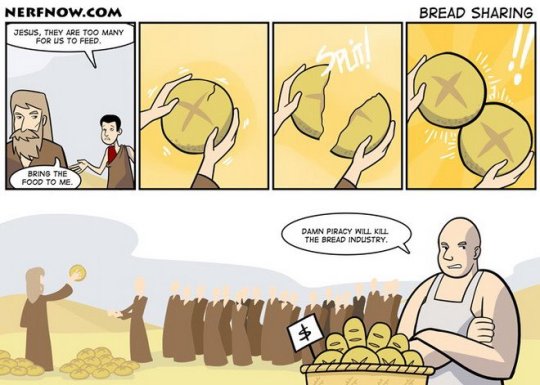Text
The Rise of Cloud Gaming
Let’s talk about cloud gaming! With the recent launch of Google Stadia and similar services offered by competitors, cloud gaming has become the hot subject of the month.
It’s the idea of a video game being processed and rendered on a cloud service and then directly streamed to a user’s device, thus avoiding the investment of a decent PC or console on the user’s part.
The concept has been around for some time now, but until this year it could never be fully implemented due to latency and scalability issues. These issues can now mostly be tackled with 5G and edge computing.
5G has the potential to drastically decrease the latency of networks, allowing for a smooth and responsive gaming experience. But this requires wide-scale implementation of the technology. Take China, for example, which is predicted to become the world’s largest cloud gaming market due to its rollout of 5G mobile phone services and culture of mobile gaming.
Edge computing allows data to be processed at closer physical locations, which further cuts down latency.
Scalability remains an issue, though. Streaming games at 4k 60fps (which is what Stadia promises) to millions of users around the world is a tremendous infrastructure cost, even when using edge computing. And built-in redundancy brings an extra cost. Considering that, it’s not certain whether these services will pan out to be commercially viable. Even in China, streaming games over the cloud currently costs companies more than it’s worth.
Since this is an IT Law Blog, I’m going to address some of the legal issues, too (though there’s not much literature on the topic yet).
Some more legislation on the cross-border portability of online content services would be nice, for a start. We don’t want cloud gaming to be region locked.
Next: who owns the game data and how do the licenses work? It’s already become normalised in today’s industry to buy video games digitally from large distribution platforms. We technically only buy licenses to those games, but at least we can download them and thus have some measure of control. With cloud gaming, which operates on a SaaS model, we have even less control. If we don’t own the game, do we at least own the save data? Where is it stored? Would mods even work with cloud gaming?
Liability is another issue. If the service fails, is it the network provider’s or the gaming service provider’s fault? What if the hardware malfunctions?
Right now, the market seems a bit oversaturated with cloud gaming services, so it can be excepted that some companies will eventually buckle under the competition. It also remains to be seen whether it’s a profitable model and whether the scalability concerns will be addressed. The legal developments might be interesting to follow.
If you want to listen to someone really tear into Stadia, watch this.
0 notes
Text
IoT in the Workplace
The facts
There has been a lot of media focus on home IoT devices, but outside of business news and the occasional public outcry at Amazon, there has been comparatively little talk about IoT in the workplace.
Let’s start some benefits that are presented by these IoT companies. Workplace safety could be improved considerably through sensors on worker equipment and in the environment, which would work to prevent injuries. IoT devices could issue alerts on workplace accidents and injuries and improve fire safety. However, putting tracking devices on employees could be used to force them to work harder and faster and to challenge workers’ compensation claims.
In the office environment, IoT can be implemented in various different ways (infrastructure, repurposed smart-home devices, business specific IoT). The article above literally suggests using smart coffee machines to “let employees brew coffee without unnecessary delays”, which is one of the most inhumane things I have ever read. Let people enjoy their coffee!
This leads to the biggest issue with IoT: surveillance. I have noticed a trend of employers talking about “health” and “wellbeing” as an excuse to shove fitness trackers and smartwatches on their employees (and sleep monitoring and mindfulness apps), as if they actually cared about that. They are sneaking in surveillance and data harvesting under this guise of self-care. This will seriously impede workers’ right to privacy and the companies will use the data against employees whenever they can get away with it. One article in particular writes about how overworked London’s lawyers are – have those companies considered that maybe their employees have non-existent sleeping schedules because they’re expected to work ridiculous hours?
Function creep is another issue with IoT at the workplace. Even if a technology is initially used for one purpose, say the encouragement of healthy lifestyles among employees, there is historical precedent that they will end up being used for purposes that go far beyond that. Take for example CCTV, which can nowadays be combined with facial recognition technology to measure employee enthusiasm (which sounds truly dystopian).
The GDPR: Our Saving Grace?
At least in the EU, companies have to comply with the GDPR when processing personal data. Previously, workplace surveillance measures may have been justified through consent as part of the employment contract. However, the GDPR only considers consent valid if it is (among other things) freely given and withdrawable. Considering the significant power imbalance in the workplace, an employee would have no choice but to go along with any company-wide implementation of personal IoT devices. Consent in this context seems illegitimate by default.
Another applicable justification under the GDPR might be legitimate interest. This argument might win out where worker safety is concerned, but excessive employee surveillance is much more questionable.
It will ultimately be up to the courts to apply these standards. It’s only a matter of time until a significant case comes along. As a future employee myself, I hope they will choose privacy.
TL;DR literally this post.
0 notes
Text
Google has come up with yet another way to track people online
The story
According to Brave (which is a smaller competitor of Google that offers a privacy-based browser), Google is using hidden webpages to track users for advertising without their consent. The allegation is part of a complaint that Brave filed against Google and its ad exchange business with the Irish Data Protection Commission. Google is denying these specific allegations but claims to be cooperating with the investigation.
Google is allegedly tracking users’ browsing activity in Chrome through hidden push pages that advertisers can log into. Advertisers then match this information, using a unique identifier, with what they already know about the user to create elaborate advertising profiles. They can also trade and cross-reference the data with other advertisers. This allows them to serve up personalised ads even when users have opted out of tracking cookies.
If Brave’s allegations about the unique identifiers are true, then we’re dealing with personal data under the GDPR. A somewhat ambiguous ECJ press release following the Planet49 case (C-673/17) established that storage of cookies requires a user’s active consent. While these push pages aren’t technically cookies, they fulfil basically the same purpose – which is an argument in favour of applying the same restrictions to them. Even if the argument that this data is processed for legitimate reasons was valid, Google would still fall short of Art. 21 GDPR, which requires them to inform users about their right to object to such processing.
Regardless of whether it’s technically a GDPR violation, Google was still lying to our faces about caring about privacy (not that we believed them, but still). They likely figured that whatever fine they would eventually have to pay would be offset by the extra profits from using these tracking pages. Every company has to comply with the GDPR now, so finding a sneaky workaround gives Google a competitive edge.
What now?
I’m not a tech person, so I don’t know if current anti-tracking plug-ins protect against these types of push pages. For anyone who is still using Chrome, this might be a good opportunity to finally switch over to some other browser (I say, as I’m writing this in Chrome).
I’m not optimistic about the future, though. Even if Google has to pay a fine and is ordered to stop the practice, they’ll come up with something newer, even more insidious and then the whole circus will start anew. Privacy will always be an arms race as long companies have a profit motive.
Resources
Here are some decent articles on the topic.
Financial Times (paywall): Google accused of secretly feeding personal data to advertisers
BBC: Google's 'secret web tracking pages' explained
The Register: Brave accuses Google of trampling Europe's GDPR with stealthy netizen-stalking adverts
CPO Magazine: Allegations of Google’s Hidden Web Tracking Pages Raise New Privacy Concerns
0 notes
Text
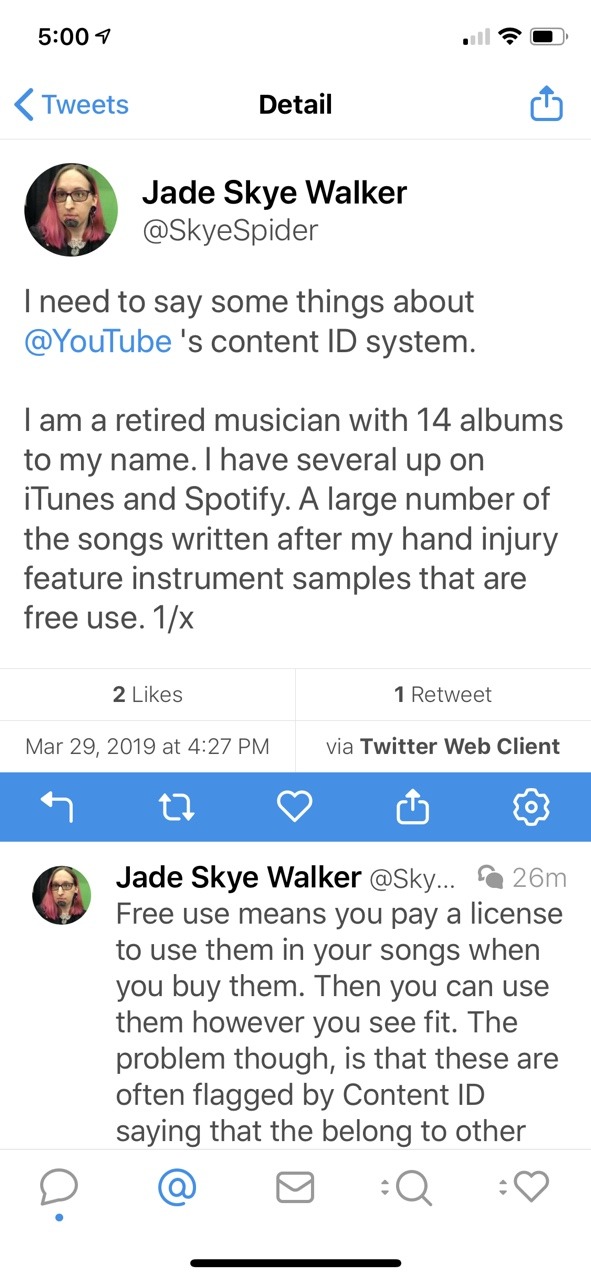
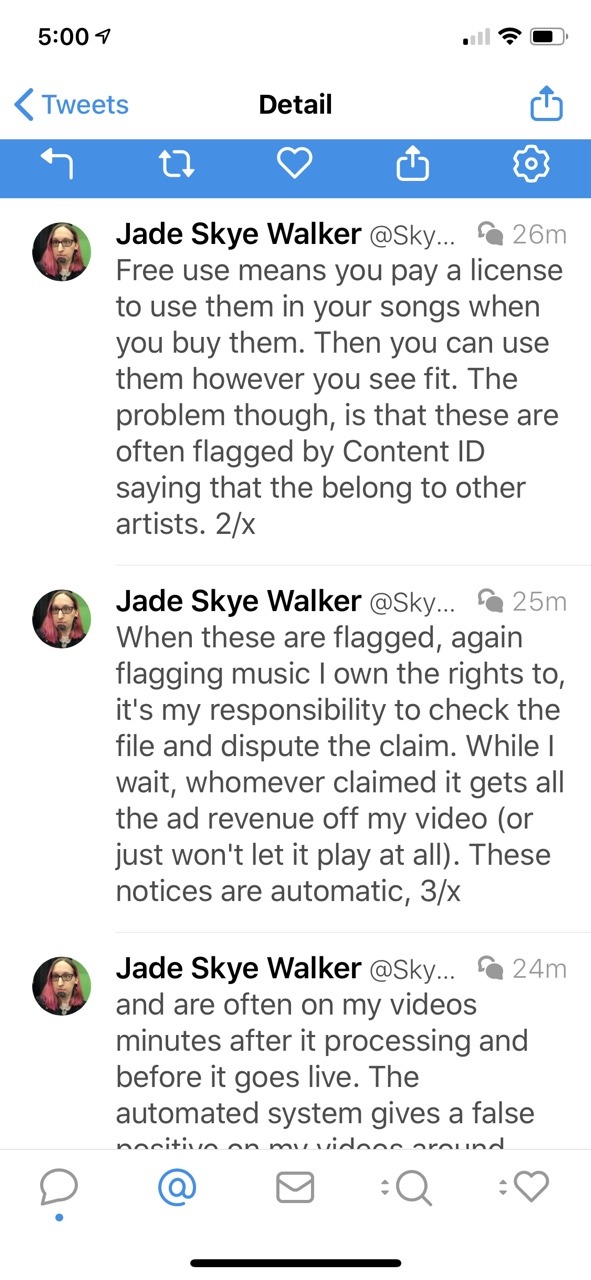
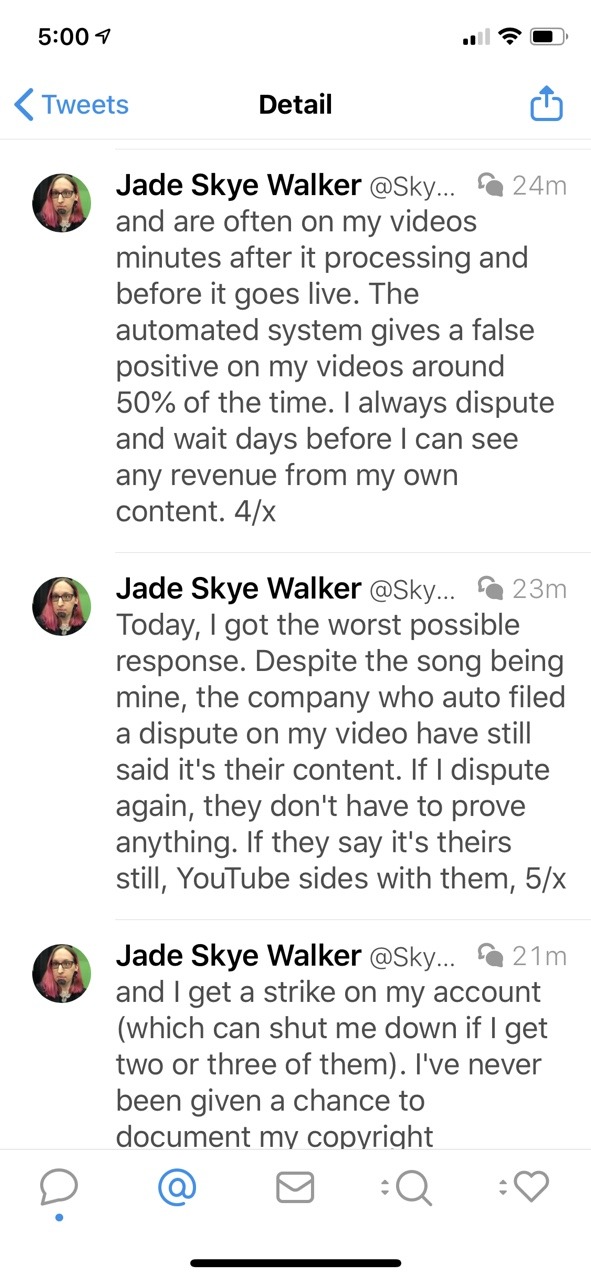
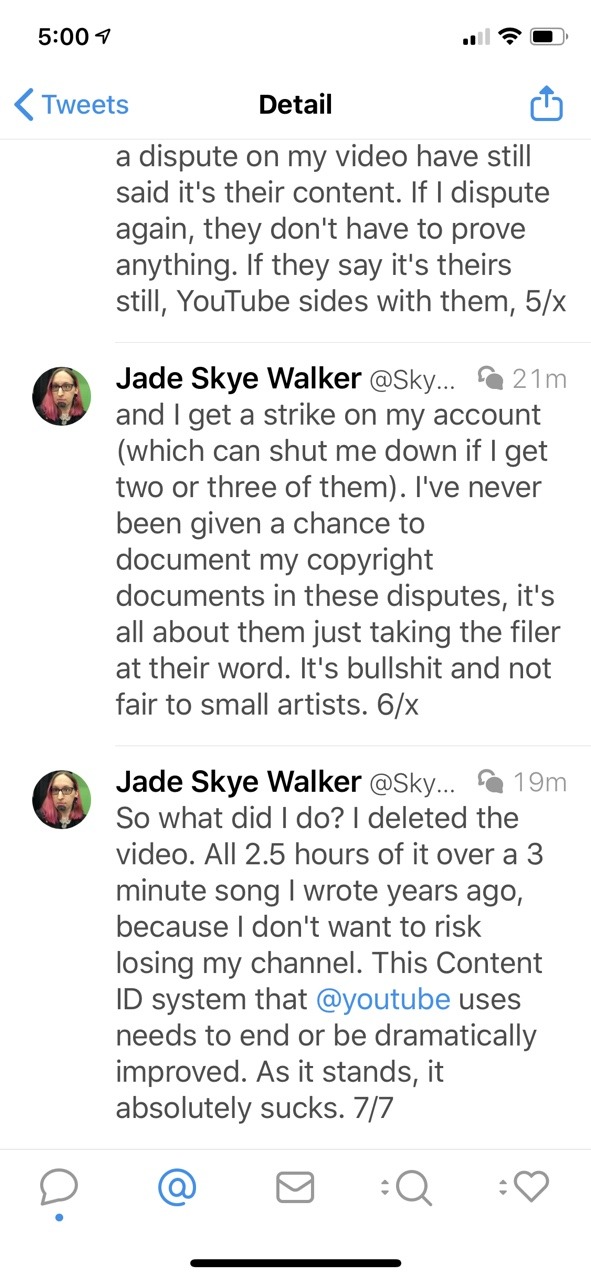
This is a thread from my personal twitter. This shitty system pisses me off so much!
105 notes
·
View notes
Note
hey, so you seem to know a lot about politics. i don't understand what the hell is going on with article 13 again? like i get it, it was voted upon but is it really going to change anything? or is it just tumblr trolls trying to get a rise out of people for nothing? wasn't it supposed to be a directive for countries?(also why everyone's biggest concern over eu banning memes?)
Okay, first of all, it’s so funny that I’m now somehow known as “the one who seems to know about politics”, seeing how I’ve been known to be very vocal about my absolute distaste for politics. But, yeah, I study law, which is basically just the aftermath of politics, so I guess I do keep kind of updated.
So yeah. Okay.
Article 13: Here we go again 🎶my, my, how can I resist ya🎶
Oh boy. Where do we even start with article 13.
Well, first of all, the parliament voted on reworking the directive and then voting on it again next year. The draft proposals have slowly started becoming public though, and that is most likely the reason behind people having started to freaking out again. Why people are freaking out is a pretty big question though. I’m not saying it’s most likely because of right-winged anti-EU advocates, but it’s most likely because of right-winged anti-EU advocates.
I explained the basis of a directive back in June, and attached the then-proposed draft text. And yes!! You’re very correct in it being a directive for countries! The proposal has gone through a number of votes and redrafts since then though, and this is the current form of article 13 that is being discussed;
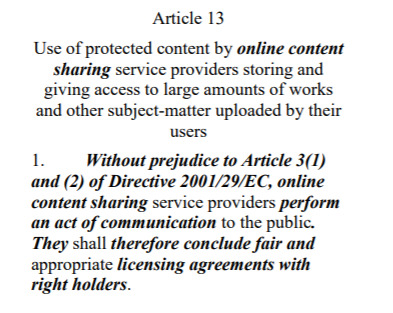

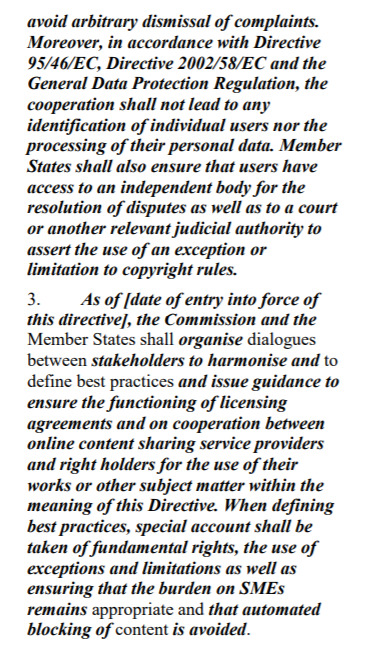
So, the first thing here; this is still a draft. Nothing has been decided yet. Not even the final text that is going to be voted on. The directive is being discussed behind closed doors as we speak, and things may still change before the vote goes through. But for now there is nothing substantial for us to be drawing any kind of conclusions from. Pretty much anything can happen from this point out.
But, if we’ll go through the changes that has happened in the last couple of months;
First of all, the so called “bots”, that was the biggest fear concerning article 13, have been removed. This is huge news!! This is great news!!!
I explained why bots would have been such a fucking bad idea here, and in this draft they have removed the “effective content recognition technologies” aka. bots, and put in place a human review system instead. This is much more in line with the already existing copyright laws, and means that automated blocking of content will be avoided, as stated in the third paragraph.
Any complaint of copyright infringement will now go to human review instead, which will most likely end in the same situation as when my class of law students, most of which does not even have a single artistic bone in their body, discussed if a few different shades of magenta constitutes as copyright infringement or not. Copyright law is weird y’all.
The memes!! Are also so fucking safe in this draft!!!
They’ve never really been in danger though, but the parliament has gone the extra mile and clearly stated that memes, and all other transformative works as in “non-infringing works or other protectedsubject matter, including those covered byan exception or limitation to copyright”, is not part of the scope of this article and, in extension, the rest of the directive.
This covers fanart, fanfiction, edits, parodies, and just any and all transformative work you can think of. Whatever you’re thinking of and freaking out over, it’s most likely never been threatened to begin with.
And like. I get that this can seem all very scary and threatening, seeing how it deals with things that we’re all very passionate about i.e. the power struggle between copyright and transformative works, and on the very specific battle ground of the internet, which we are all very protective of and how the directive text doesn’t really give that much to go on, especially not for people not used to legalese. But what I need everyone to understand is that what the directive is aiming for, is the pirating industry. Of people taking very clearly copyrighted material and uploading it to the internet, without any own input, for public consumption, and for their own gain. This is what the directive is aiming to get a better grip on, and that is the scope the EU is giving the member states to regulate. Any and all transformative work is as safe as it’s ever been, both on and off the internet.
So no, your social media isn’t going to be shut down. No, the EU isn’t going to erase your fanworks and make you pay fines for it. And no, the EU isn’t going to ban memes, jesus christ, why would they even want to do that.
What the directive sets out to regulate is that “onlinecontent sharing service providers”, i.e. corporations such as Facebook and Youtube, have to take responsibility for the copyright infringement on their platforms. This will not in any way affect you as a user of said platform. Even if you’re such a vaguely shitty person that you upload an entire copyrighted movie in its unedited form to a video sharing platform, nothing is going to happen to you as an individual. At least not in relation to the directive, you can still be sued for copyright infringement due to your national laws, but that’s a whole other story. What the directive regulates is that it’s the platform’s obligation to give the copyright holder their fair share of the revenue, seeing how the infringement takes place on their platform. Hence the huge backlash from Youtube and the like. These huge, multi-billion companies, would suddenly have to take responsibility for the copyright infringement that takes place on their platforms on a daily basis.
And if you still think that’s unfair, then yeah, go wild, I guess.
But the hysteria that has spread across tumblr in particular, is so completely unfounded. As I’ve already stated, this is the draft of a directive, which means we really have no way of knowing how or when this is all going to fall out in the end, and copyright law is already so fucking weird, that I have a really hard time seeing how this will even make a dent in the status quo of things.
So just. Please. Calm down. This is not even anywhere near as bad as everyone is crying and screaming about it being. Unless you’re a money sucking social media platform or a political Pirate, then you probably still think this is pretty fucking bad. CoughcoughJuliaRedacoughcough.
And, as usual, this has just derailed to me babbling on without really knowing where I’m heading. But also as usual, don’t be afraid to ask me follow-up questions, and I’ll try to answer them as clearly as I can!! I also highly recommend everyone to read through the commission’s FAQs regarding the directive! Their answers can get a little technical at times though, so if you need help translating what they’re saying or just want to clear anything up, don’t be afraid to ask!
But just. Please. Please. Everyone calm down. You’re all giving me heart palpitations just thinking about this whole mess.
342 notes
·
View notes
Photo
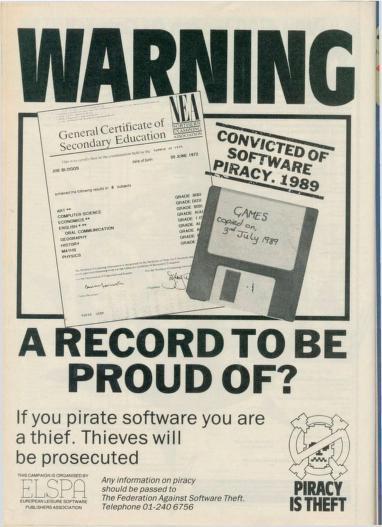
Your Sinclair Magazine, January, 1990
18 notes
·
View notes
Photo
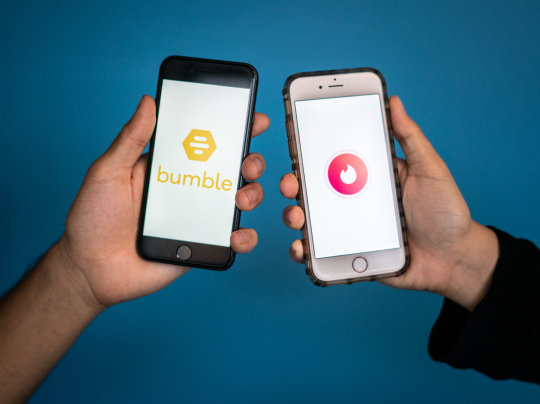
The popular apps Tinder and Bumble have upended dating culture, all with a swipe.
But Tinder’s parent company says the similarities between the apps suggest another kind of swiping — of ideas.
In dueling lawsuits, Match, which owns Tinder, alleges that Bumble stole Tinder’s intellectual property. Bumble says those claims are bogus, designed to drive down Bumble’s worth and “poison Bumble in the investment market,” according to Bumble’s lawsuit.
The dispute between the two companies illustrates a recent shift in how the American legal system treats software patents. And, in general, it highlights the challenges of taking a patent system designed to protect inventors of machines … and applying it to the Internet era.
The Tinder-Bumble Feud: Dating Apps Fight Over Who Owns The Swipe
Photo: Cameron Pollack/NPR
114 notes
·
View notes
